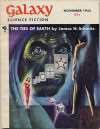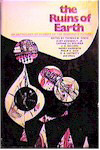

Writing Date |
Pub. Date |
Previous |
Next |
Notes |
|
81 |
<Oct 11, 1954 |
Nov 1955 |
9000 wds |
FIRST PUBLICATION
 Galaxy Science Fiction, Nov 1955
Galaxy Science Fiction, Nov 1955 HISTORY:
The manuscript for "Autofac" showed up at the SMLA on the same day as that for "Service Call" – Oct 11, 1954. The story was sold to Galaxy and was printed in the Nov 1955 issue of that magazine.
A popular story over the years, "Autofac" was selected for five anthologies including THE BEST OF PHILIP K. DICK, before publication of THE COLLECTED STORIES in 1987.
This story caused strife between PKD and Horace Gold, editor of Galaxy. Gold’s custom was to alter facets of stories accepted by Galaxy, a practice which did not sit well with the authors. Philip K. Dick was annoyed at this meddling with "Autofac" and wrote,
"Despite the fact that Galaxy was my main source of income I told Gold that I would not sell to him unless he stopped altering my stories -- after which he bought nothing from me at all."
Later, though, Philip K. Dick did sell stories to Galaxy but no earlier than "War Game" in 1959.
Here’s a precis of the story courtesy of Hazel Pierce:
To sustain the population during a war, far-sighted engineers built completely automated underground factories. Sophisticated in design, each one seeks its raw materials, manufactures and delivers the goods, and in extremis repairs or rebuilds itself elsewhere. To the survivors struggling to establish the necessary agrarian economy, the glut of manufactured stuff proves burden, not boon; the men cannot win. The autofacs outwit all efforts toward their destruction by the sheer complexity of their own survival programming.
Of "Autofac" Dick wrote in 1976:
Tom Disch said of this story that it was one of the earliest ecology warnings in sf. What I had in mind in writing it, however, was the thought that if factories became fully automated, they might begin to show the instinct for survival which organic living entities have... and perhaps develop similar solutions.
"Autofac" is akin to "Pay For The Printer" and rates ó ó ó ó
Other Magazine and Anthology appearances
More Cover Pix Here: 
| 1956 Feb | GALAXY, #35 {UK} | ||
| 1971 |  |
THE RUINS OF EARTH, Putnam, hb, ?,1971, ?, $6.95 (?) {Ed. Disch} | |
| 1972 |  |
BEYOND CONTROL, Thomas Nelson (NAL?), hb, ?, 1972, 219pp, $5.95 (?){Ed. Silverberg} ISBN:0-525-66236-7 or 0-8407-6236-4 | |
| 1973 | BEYOND CONTROL, ?, hb, ?, Nov 1973, ?, ? (?) {Ed. Silverberg} ISBN: 0-283-97989-5 | ||
| 1973 | THE RUINS OF EARTH, ?, pb, ?, Feb 1973, ?, ? (?) {Ed. Disch} 0-091-10450-5 | ||
| 1974 | BEYOND CONTROL, ?, hb, ?, Mar 1974, ?, ?, (?) {Ed. Silverberg}ISBN: 0-816-16091-0 | ||
| 1974 |  |
BEYOND CONTROL, Dell, pb, 1974, ?, ?, (?) {Ed. Silverberg}ISBN: 0-440-92112-0 | |
| 1974 | SCIENCE FACT/FICTION, Scott Forsman & C0., pb, tp,1974, 394pp, $4.95 (?) {Ed. Farrell, Gage, Pfordresher, Rodrigues} )-673-03407-0 | ||
| 1975 |  |
THE RUINS OF EARTH, Arrow, pb, ?, 1975, ?,?,(?) {Ed. Disch} 0-099-09440-1 | |
| 1977 |  |
THE BEST OF PHILIP K. DICK,Ballantine, pb, ?, 1977, ?, ? (?) | |
| 1984 |  |
ROBOTS, ANDROIDS AND MECHANICAL ODDITIES, SIUP, hb, ?,?,? (?) {Ed. Warrick} | |
| 1987 | THE COLLECTED STORIES OF PKD | ||
NOTES:
CSVol4 375
Tom Disch said of this story that it was one of the earliest ecology warnings in sf. What I had in mind in writing it, however, was the thought that if factories became fully automated, they might begin to show the instinct for survival which organic living entities have... and perhaps develop similar solutions. {PKD 1976}
Levack
The factories had been designed to supply human needs in a war-torn world. With the war over, the factories still supply everything automatically: a kind of utopia. Men, however, wish to resume control of their own means of production -- but the factories possess a mechanical vitality and some very human characteristics. -- Steven Owen GoderskySRG 43
Just as deadly in its ecological impact is the non-military treadmill fueled by planned obsolescence and conditioned buying habits. In "Autofac" Dick envisioned one possible result. To sustain the population during a war, far-sighted engineers built completely automated underground factories. Sophisticated in design, each one seeks its raw materials, manufactures and delivers the goods, and in extremis repairs or rebuilds itself elsewhere. To the survivors struggling to establish the necessary agrarian economy, the glut of manufactured stuff proves burden, not boon; the men cannot win. The autofacs outwit all efforts toward their destruction by the sheer complexity of their own survival programming.
TTHC 262
{William} Tenn has written "it was so awful to find a paragraph of Horace's private musing in the middle of one of my stories I swore (falsely) never to send him a manuscript again." 15 What Tenn swore to do, Dick did:"Despite the fact that Galaxy was my main source of income I told Gold that I would not sell to him unless he stopped altering my stories -- after which he bought nothing from me at all." 16
Thus ended the Gold-Dick relationships. {...}
{fn16: Dick, "Memoir," 232. Dick's secession from Galaxy is confirmed by a letter from Meredith, 1-17-56 (published in PKDS-17 5). "I refused to sell any more stories to Galaxy," he told Kandy Smith in 1973. "They kept making changes that I hadn't written, and my name appeared on it too... If he didn't like the kind of girl you had in your stories, he'd take her out and make her a pumpkin." The story that seems to have done it for Phil was "Autofac."}
Collector’s Notes
Credits Navigation philipdick.com Novels Short Stories References